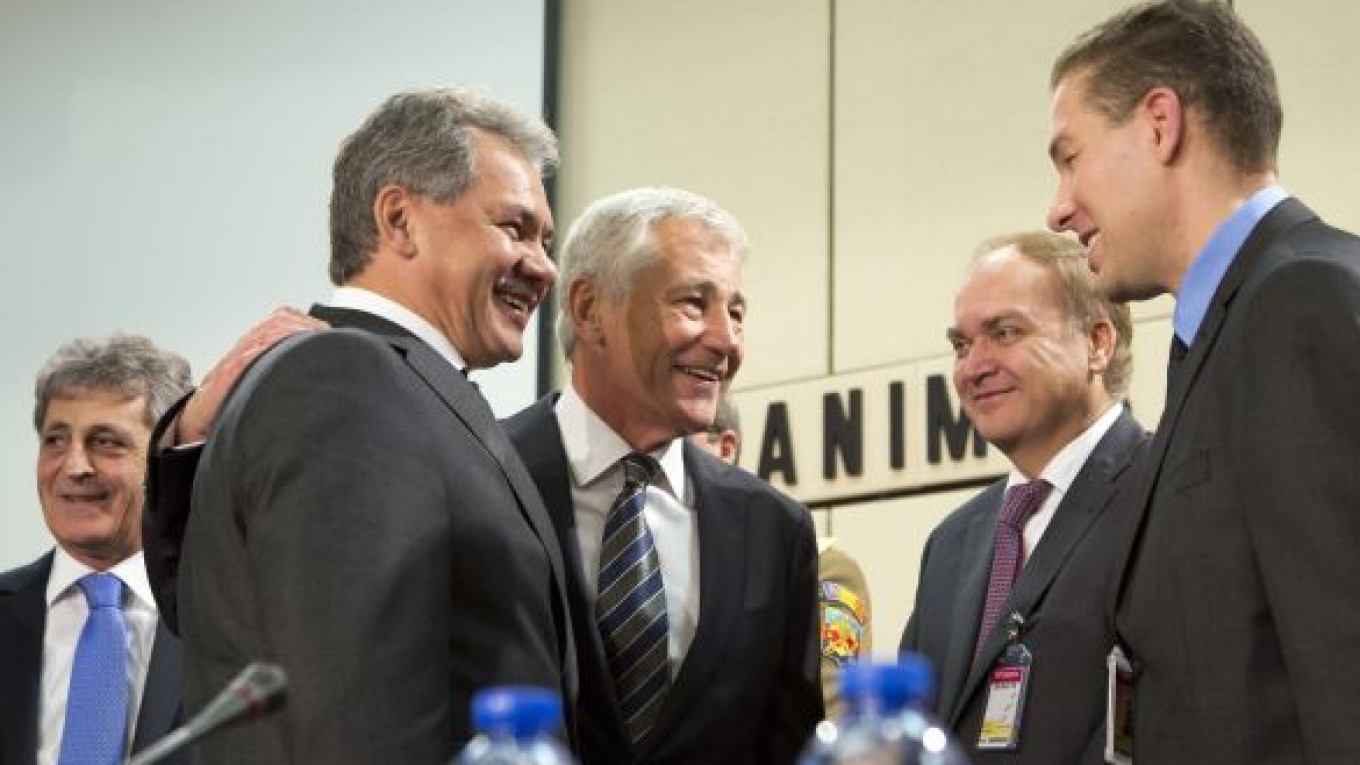BRUSSELS — NATO and Russia could play a role in eliminating Syria’s chemical weapons stockpiles if they were asked to do so by the United Nations, said U.S., NATO and Russian officials Wednesday.
The destruction of Syria’s chemical weapons was discussed at a meeting of NATO and Russian defense ministers in Brussels, the first such meeting in two years.
That raised the possibility that Russia and NATO, which usually regard each other with suspicion, could end up cooperating in tackling the problem.
NATO Secretary-General Anders Fogh Rasmussen said he expected NATO allies and Russia to respond positively if the UN asked them to help deal with the Syrian weapons.
“Whether that would be executed on an individual national basis or collectively, it is really premature to make any assessment on that at this stage,” he told reporters.
U.S. Defense Secretary Chuck Hagel also foresaw a possible role for NATO.
“If we can continue to see progress made … in destroying chemical weapons in Syria, then it seems to me that this is going to open opportunities for a lot of nations to play roles in Syria in order to accomplish the objective. It may well be that NATO will be asked for some assistance,” he told a news conference after the meeting.
“Russia and NATO have many areas of common interest, including the destruction of Syria’s chemical weapons stockpiles,” he said.
But he stressed that there were “no plans to have any U.S. forces in any way in Syria.”
Defense Minister Sergei Shoigu said that if Russia received a request for help with eliminating the Syrian weapons, it would consider it and was ready to discuss this with NATO countries.
Deputy Foreign Minister Sergei Ryabkov said last month that Russia was ready to help guard Syrian chemical weapons sites and destroy Syrian President Bashar Assad’s stockpiles, but would not ship any of the chemical arms to Russia for destruction.
Russia and the U.S. are the only countries with industrial scale capacity to destroy mustard, VX, sarin or cyanide-armed munitions, but the import of chemical weapons is banned under U.S. law.
NATO has shunned any involvement in the Syrian conflict apart from sending Patriot missiles to protect neighboring Turkey.
After years of confrontation over Syria, Russia and the U.S. brokered a deal last month to put Assad’s chemical arms stockpiles under international control.
The agreement avoided possible U.S. military strikes that Washington said were intended to punish Assad for an Aug. 21 poison gas attack.
In another sign of a thaw in relations between the U.S. and Russia, Hagel said he and Shoigu had agreed to hold regular video conferences to seek areas for cooperation.
Relations between Washington and Moscow have been chilled by the Syria conflict and Russia’s granting of temporary asylum to U.S. intelligence leaker Edward Snowden.
Despite cooperation in areas such as counter-terrorism exercises, Russian and NATO officials made clear there had been no progress on the main issue dividing them — NATO’s plans to build an anti-missile system that Russia fears will weaken its nuclear deterrent.
A Message from The Moscow Times:
Dear readers,
We are facing unprecedented challenges. Russia's Prosecutor General's Office has designated The Moscow Times as an "undesirable" organization, criminalizing our work and putting our staff at risk of prosecution. This follows our earlier unjust labeling as a "foreign agent."
These actions are direct attempts to silence independent journalism in Russia. The authorities claim our work "discredits the decisions of the Russian leadership." We see things differently: we strive to provide accurate, unbiased reporting on Russia.
We, the journalists of The Moscow Times, refuse to be silenced. But to continue our work, we need your help.
Your support, no matter how small, makes a world of difference. If you can, please support us monthly starting from just $2. It's quick to set up, and every contribution makes a significant impact.
By supporting The Moscow Times, you're defending open, independent journalism in the face of repression. Thank you for standing with us.
Remind me later.






